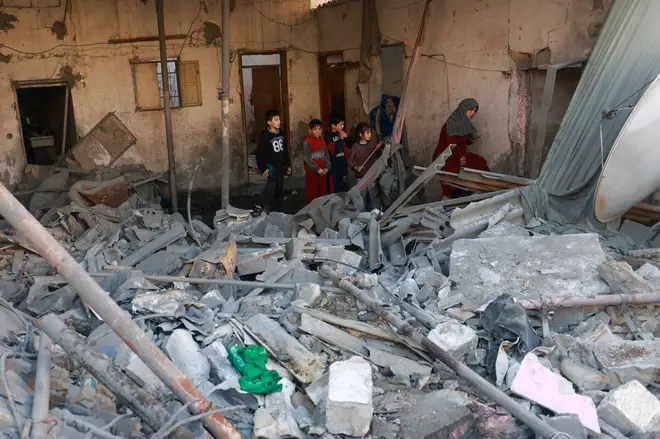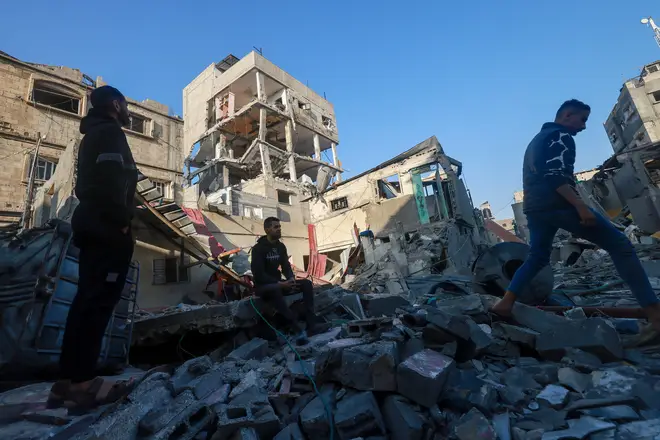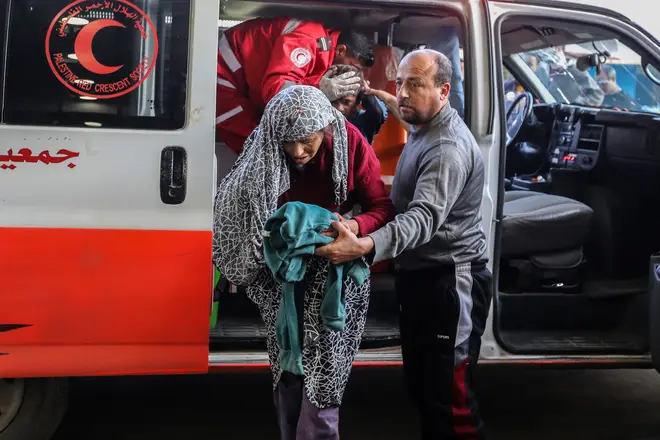
Natasha Devon 6pm - 9pm
3 December 2023, 21:19 | Updated: 3 December 2023, 21:20

Israeli military operations now cover every part of the Gaza strip as the IDF expands the war following the end of its truce with Hamas.
The Israeli military said on Sunday that it had expanded its ground operations to every part of Gaza and ordered more evacuations in the crowded south, followed by heavy bombardment, as it vowed that operations there against Hamas would be “no less strength” than its earlier offensive in the north.
Palestinians in the Gaza Strip said they were running out of places to go in the sealed-off territory that borders Israel and Egypt.
Many of the territory’s 2.3 million people are crammed into the south after Israeli forces ordered civilians to leave the north in the early days of the two-month-old war.
With the resumption of fighting, hopes receded that another temporary truce could be negotiated. A week-long ceasefire, which expired on Friday, had facilitated the release of dozens of Gaza-held Israeli and foreign hostages and Palestinians imprisoned by Israel.
Prime Minister Benjamin Netanyahu said in an address on Saturday night: “We will continue the war until we achieve all its goals, and it’s impossible to achieve those goals without the ground operation.”
White House National Security Council spokesman John Kirby said that the US is working “really hard” for a resumption of negotiations.
Whilst senior Hamas official Osama Hamdan said resuming talks with Israel on further exchanges must be tied to a permanent ceasefire.
On Sunday, the Israeli military widened evacuation orders in and around Khan Younis, asking residents of at least five more areas and neighbourhoods to leave for their safety.
Talks to restart the truce between Israel and Hamas broke down on Saturday, as Israeli negotiators were recalled from talks by Benjamin Netanyahu.
Some 193 people have been killed in Gaza, and 650 wounded, since the Israel-Hamas war restarted on Friday morning, according to local Hamas-affiliated authorities.
Israel launched its armed forces back into the conflict at the end of the seven-day truce, focusing strikes on the southern Gaza strip this time. The Israeli military said it had struck 400 Hamas targets with air strikes, tank fire and its navy since Friday morning.
Israeli intelligence agency Mossad had been in talks to restart the truce in Qatar, but Mr Netanyahu's office said they had been recalled.
The discussions had focused on the possible release of new hostages, and the parameters for a second truce. Some 105 hostages were returned during the original seven-day ceasefire, in exchange for 240 Palestinian prisoners being let out of Israeli prisons.

Previous efforts had largely concentrated on the north of the territory, where Hamas has traditionally been strongest. Hundreds of thousands of people had been told by Israel to move to southern Gaza, away from the worst of the fighting.
But on Friday morning, residents of Khan Younis, a large city in the south, were told to leave the city to shelter areas because it would soon become a combat zone.
And Saturday saw Israel's first use of a map that divided Gaza into numbered sections. Israel has told residents to work out which section they live in, in case of an evacuation order.
The first order to evacuate came for people living in the areas of Al-Qarara, Khirbet Khuza'a, Abasan, Bani Suhaila and Ma'an. They were told to go to shelters in Rafah/
The UN has criticised the use of the map, questioning how people are supposed to access it with frequent outages in electricity and internet access.

Over 15,000 people have been killed in Gaza since the start of the war, which was sparked when Hamas launched attacks into southern Israel, killing 1,200 and taking more than 240 people hostage.
The US, Israel's biggest ally and backer, had earlier urged the IDF to protect civilians better during the next stage of the conflict.
US Secretary of State Anthony Blinken said: ""This is going to be very important going forward. It's something we're going to be looking at very closely."

A man who fled from northern Gaza to Khan Younis a month ago with his wife and three children said: "There is no place to go.
Emad Hajar added:"They expelled us from the north, and now they are pushing us to leave the south."

It comes after an Israeli spokesperson blamed the end of the truce on Hamas, who “decided to terminate the pause” by not releasing all the female hostages the terrorist group had kidnapped on October 7.
Eylon Levy said: “Having chosen to hold onto our women, Hamas will now take the mother of all thumpings.”
It follows the end of a truce deal with Gaza – which had allowed for the release of Palestinian prisoners, hostages and aid.
Mr Levy claimed his government had already approved a list of Palestinian prisoners who could have been freed in return for Hamas hostages.
He said the militant group failed to meet its "obligations" and therefore missed out on a chance to extend the week-old pause in fighting by another two days.
Hamas threw the blame back, saying Israel had “persistently” rejected offers of hostage releases.
Within minutes of the truce expiring, Israeli air strikes pounded the Gaza Strip.
Reports also suggested tanks were being repositioned within the area.
The Israel Defence Force confirmed “warplanes” would start focusing again on Gaza.
It also claimed Hamas first broke the truce, firing rockets before it was due to end at 7am local time (5am GMT).
Hamas violated the operational pause, and in addition, fired toward Israeli territory.
— Israel Defense Forces (@IDF) December 1, 2023
The IDF has resumed combat against the Hamas terrorist organization in Gaza. pic.twitter.com/gVRpctD79R
With Israel continuing its brutal offensive on its Palestinian neighbour, the United Nations Secretary-General Antonio Guterres was prompted to show “deep regret”.
“I still hope that it will be possible to renew the pause that was established," he added.

Despite the ceasefire coming to an end, Qatar confirmed it was still negotiating an extension to the ceasefire.
The Ministry of Foreign Affairs said on Friday they were continuing talks “with the aim of returning to a pause”.
On the same day, Israeli Prime Minister Benjamin Netanyahu claimed Hamas had not respected “its obligation to release today all the abducted women and launched rockets toward the citizens of Israel”
He insisted the “government of Israel is obliged to accomplish the targets of the fighting”, including the release of hostages and “to liquidate Hamas”.
Mr Levy said Hamas was still holding 137 hostages, 10 of which were over the age of 75.